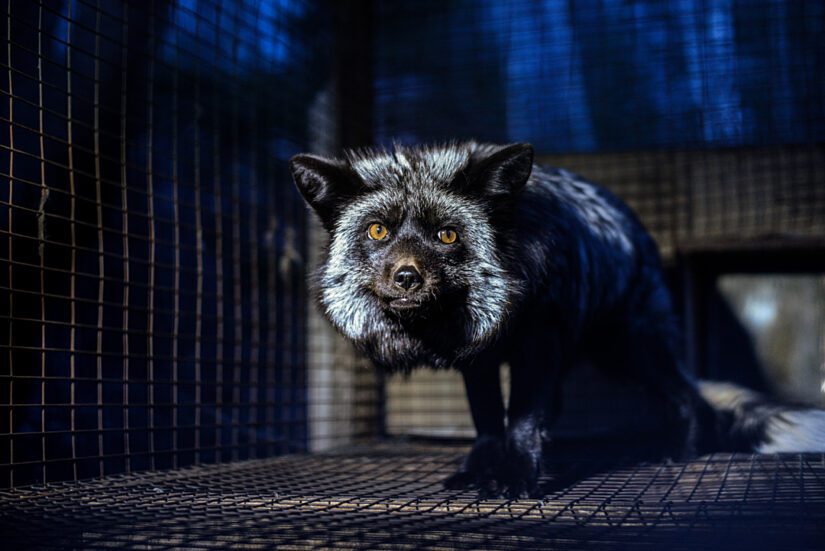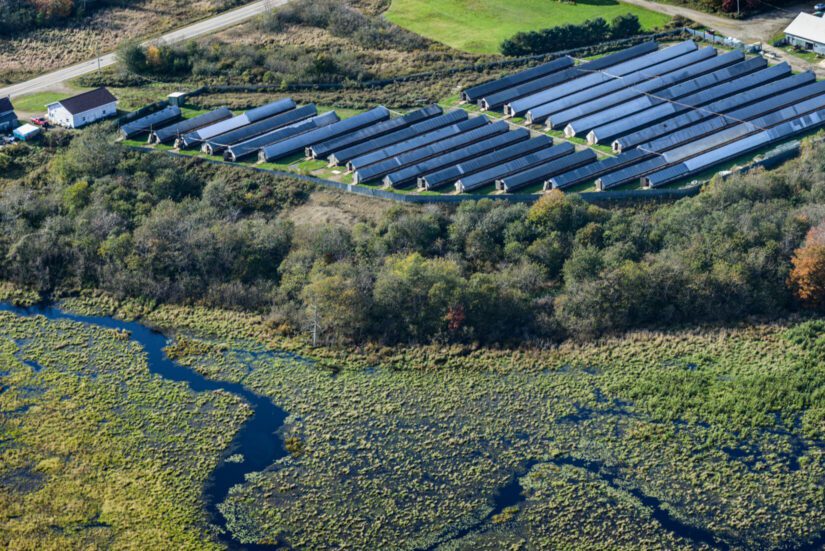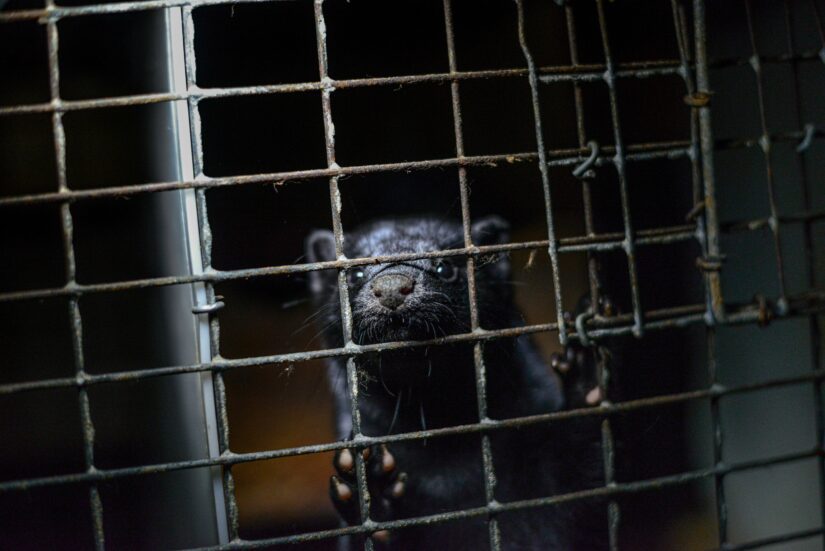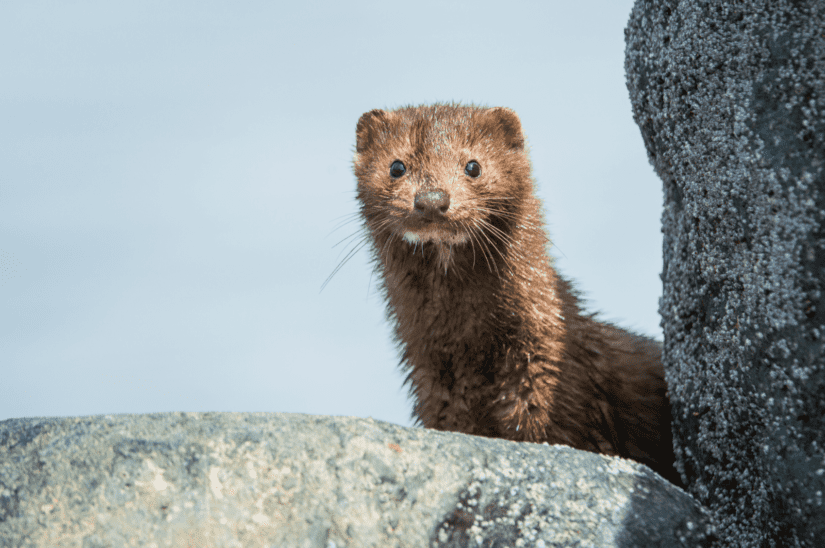Fur farming is an intensive farming practice that confines wild animals in small cages before they are killed for their fur. The fur pelts are mainly sold to international markets for the luxury fashion industry.
What is life like for animals raised on fur farms? Find out now in Canadian Fur Farms: Exposed. This documentary, developed by The Fur-Bearers and featuring BC SPCA’s Dr. Sara Dubois, uncovers the harsh realities of fur farming in Canada.
Disclaimer: This documentary contains graphic visuals that some viewers may find disturbing.
Status of fur farming in Canada
Hundreds of thousands of animals are farmed for their fur in Canada each year, the most common animals being mink and fox. Other animals farmed for their fur include wolves, bobcats, lynxes and chinchillas. According to the 2021 Census of Agriculture, there were 79 mink and 18 fox farms in Canada. Nova Scotia and Ontario are the largest fur-producing provinces. Records obtained by The Fur-Bearers revealed that Canada’s fur farm industry, which is facing decline and increasing public scrutiny, has received over $27 million in federal loans since 2019.
In B.C., wild animals can be farmed for their fur under the Animal Health Act – Fur Farm Regulation. In 2021, the B.C. government announced a ban on mink farming in the province under this regulation – the only province with any fur farming ban. Unfortunately, it is still legal to farm other animals for fur in B.C. Currently, there is one fur farm in the province, which raises chinchillas.
The BC SPCA opposes fur farming, but unfortunately, this is a legal industry in Canada. Until the fur industry no longer exists, we expect mink and fox farms to meet the requirements outlined in the Canadian Codes of Practice for farmed mink and farmed fox.
The Codes of Practice are developed through the National Farm Animal Care Council, and all mink and fox farmers are expected to meet these minimum standards. However, there is no independent monitoring in place, meaning there is no assurance that the standards are being met. There are no Codes of Practice for chinchillas or other animals raised for fur.

Impacts to animal welfare
Fur farming is inherently inhumane, as wild animals are bred and raised in captivity for our use. Even after generations of being farmed, these animals remain wild in nature. They still have the animal welfare needs of their wild counterparts, which cannot be met on a farm.
Animals on Canadian fur farms live in extensive home ranges in the wild. On fur farms, these animals spend their entire lives in small cages. They cannot run, hunt, socialize or engage in many natural behaviours they would in the wild. Because of this, animals on fur farms suffer from serious physical and psychological problems.
Other impacts of fur farming
Environment
Fur farming can negatively impact the environment surrounding the farm and even extend far beyond. Manure runoff from fur farms can affect the soil and the water quality in nearby bodies of water or groundwater, harming ecosystems.

Public health
The intensive nature of fur farming can increase the risk of disease emergence and transmission, as highlighted by the COVID-19 pandemic. Due to the close confinement of mink on fur farms and the large number of animals kept on each farm, rapid transmission of the COVID-19 virus among mink was observed on many fur farms across the globe, including in B.C. Animal-to-human transmission of the virus and the development of mink-associated variants also occurred. Fur farming also poses a risk to wild animal populations due to the threat of disease spillover from fur farms.
Reconciliation
Fur farming conflicts with traditional Indigenous values. The Union of B.C. Indian Chiefs supported the B.C. government’s decision to phase out mink farming.
Public opinion
The message from Canadians is clear: 78% of Canadians oppose farming animals for their fur (81% of British Columbians are opposed)1. A year after the B.C. government announced phasing out mink farms in the province, a commissioned poll of British Columbians confirmed that an overwhelming majority from all regions of the province agreed with the decision to close mink farms – only 8% disagreed2.

Our work to end fur farming
The BC SPCA and other animal advocates have long spoken about the concerning conditions on mink farms, including the cramped, barren housing for these wild animals. It was not until mink farming became an active public health risk, spreading COVID-19 among mink, farm workers, and their communities, that the government banned the practice, citing public health concerns. We advocated for government assistance to help farmers and workers find new sources of income and careers during the transition period.
View a timeline of our work to end mink farming in B.C.
While no mink farms exist in B.C. and no new ones can be opened, other species like chinchilla and fox can still be farmed in the province, and fur farming is legal in the rest of Canada. In November 2024, a federal petition was launched calling on the Government of Canada to prohibit fur farming of all species of animals. The BC SPCA supported this petition, which received over 7,000 signatures from Canadians. Unfortunately, this petition was not presented to the House of Commons before Parliament dissolved on March 23.
Take action
In the lead up to the 2025 federal election, over 9,500 caring Canadians helped ensure that animal welfare is a federal priority by calling on Canada’s political parties and candidates to:
- Update the Criminal Code to better protect animals and people
- End the live export of horses by air for slaughter overseas
- Expand B.C.’s mink farm ban to prohibit fur farms across Canada
With your ongoing support and action, we’ll continue advocating for these important changes with our new federal government.
References
1 Research Co. poll conducted for Fur Bearer Defenders July 24-25, 2024 (n=804, margin of error +/-3.5%, 19 times out of 20)
2 Stratcom poll conducted for the BC SPCA July 14-22, 2022 (n=1000, margin of error +/-3.5%, 19 times out of 20)

Take action for animals
Want to be the first to know about actions you can take on behalf of animals? Subscribe to receive Action Alerts.
The BC SPCA uses your personal information to update you on our work for animals as well as for advertising and analytics purposes. More information on uses and how to opt-out can be found in our Privacy Policy.
